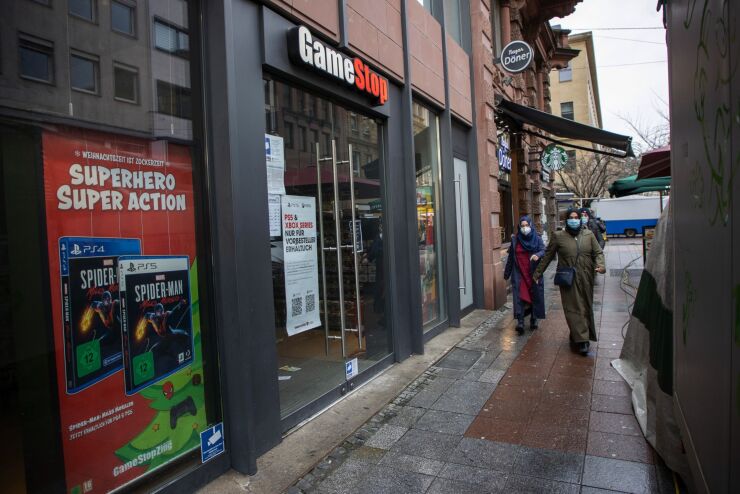I’m an indexer and have been one for more than three decades. I put my clients in the most low-cost and diversified index funds around. No attempts to beat the market with such strategies as Smart Beta. It’s precisely because I’m known for this approach that people are surprised to learn that not only do I have a fun gambling portfolio, but also that I advise clients they can do the same.
Now I wish GameStop (
So how did an indexer like me, with the trademarked slogan “
That’s why I carve out a small piece of my portfolio for, perhaps, the only fun I have in investing. I call it my gambling portfolio and tell clients they can have one too.
I’m of the opinion that everybody should have their own system to outsmart the market. My personal belief is that buying one of these stocks after a spectacular gain is following the herd and doesn’t end well. Though I don’t tell clients what they should buy, I do give them my own rules which I’ll discuss shortly.
My own personal, rather contrarian system is buying stocks that have fallen from grace that I think have about a 50-50 chance of going bankrupt.
Companies shunned by Wall Street often end up not as bad as expected, and the stock price rises if the low expectations are exceeded. Managers of investment funds don’t want to be caught holding a company when it files for bankruptcy. Though admittedly risky, I think it’s better than being part of the herd following TV gurus or buying a stock after a spectacular return. Which is why my advice is to just say no to GameStop - at least until the mania is over.
The simplest method involves having one traditional IRA and one Roth IRA, making one annual non-deductible contribution to the traditional IRA, and converting it before any gains or interest accrues.

As is human nature, I’m happy to talk about my winners such as Priceline (now Booking), IBM, and more recently BlackBerry, while conveniently blocking out my purchases of United Airlines, Delta Airlines, Eastman Kodak, and others that didn’t make it or are looking rather bleak. My BlackBerry was a virtual breakeven until this recent frenzy led by GameStop.
How has it worked?
In my emotional mind, The Gambler convinces me that I have kicked market booty with the return I’ve received. I don’t really care what my logical mind says. I could easily go back and evaluate my return versus the market, but why do that? I prefer to keep my parade unrained on.
What does this mean to the gambler in your clients?
I tell clients that their emotional brain is in the driver’s seat for their gambling portfolio. This is invested in a strategy that I feel will win by picking ultra-risky individual stocks that Wall Street doesn’t want.
I call my total portfolio a “core and casino” approach. The core part is in the logical, dull, own-the-whole-market index funds. The casino part is in the risky business stocks I pick from the emotional side of my brain, or The Gambler approach. Viva Las Vegas.
I’m happy to share my rules for a gambling portfolio with my clients.
Rules for my gambling portfolio
1. Gambling is gambling: whether it’s investing or Black Jack, I only bet what I can afford to lose. Typically, aim for less than 5% of one’s portfolio.
2. When I’m looking for that risky stock to buy, I go so far off the beaten path that I need a machete. Look for me on the wrong side of the Wall Street tracks.
3. My buy signals that catch my gambler eye include buying stocks:
- After large price declines.
- Priced below $5 which forces many institutional investors to dump.
- Media noting money managers being fired for holding a particular stock.
- Accounting scandals or any bad press about bad decisions made by the company’s management.
- Insider trading allegations.
- TV gurus saying the company is dead.
4. Make lemonade out of those stock lemons that went belly-up by harvesting the tax losses.
5. Keep perspective on my wins and losses and the territory they go with. My own version of “what happens in Vegas, stays in Vegas” (or ought to).
6. Never confuse luck with brilliance.
7. Always remember rule number one.
I let clients know that if they lose their entire gambling portfolio, it’s over. No more fun. They can’t take out another 5%. Losing a little bit of money shouldn’t have a large impact on their financial future. The much bigger risk is that they did something like buy GameStop and sell it at a 2,000% gain in a couple of weeks. They might confuse luck with brilliance, sell their index funds, and discover their luck ran out after placing a much bigger bet.






